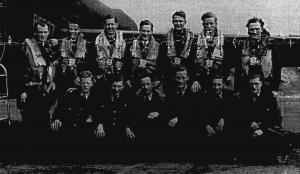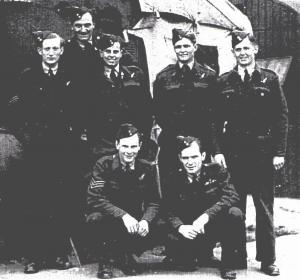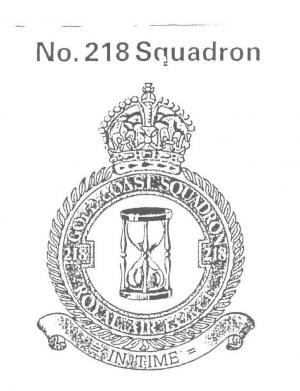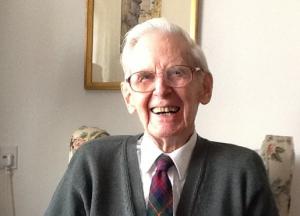A quiet time over Germany 1945
Flight Lieutenant David Howell DFC who died in January aged 97 was one of another band of brothers who after World War II together took on to build bridges with their former enemies. I am fortunate in having had the chance to work alongside them. Obituaries in The Guardian and other papers have described his service as a navigator in the RAF’s Bomber Command. But led me add more detail on a story that illustrates his commitment which began even in the midst of hostilities.
At the beginning of the war David Howell was a gardener, a reserved occupation, but despite that he volunteered for the RAF. He was following in the steps of his older brother, Wing Commander Edward Howell, OBE, DFC, who was taken prisoner in Crete and wrote the best seller Escape to Live. Their father was Moderator of Paisley Abbey.
 On 7 February 1945, as World War II was drawing to a close the younger Howell was on his 24th operational sortie when the wings of his Stirling bomber iced up and the plane went into a steep dive. Only the combined effort of pilot and flight engineer managed to level the plane at 4,000 feet long enough for the crew to jump.
On 7 February 1945, as World War II was drawing to a close the younger Howell was on his 24th operational sortie when the wings of his Stirling bomber iced up and the plane went into a steep dive. Only the combined effort of pilot and flight engineer managed to level the plane at 4,000 feet long enough for the crew to jump.
Fear had often assailed Howell on these raids and a first jump into thick clouds was no exception.. ‘But I had learned to face fear and hand it over to God,’ he said describing the experience. ‘It was a perfect moment for God to take over.’ After the first jerk of the parachute opening he remembered the sensation as pleasant. He thought first of his mother who would receive a telegram and he prayed for her. Then he thought of his friends who had introduced him to the discipline of regular moments of quiet to listen for God's guidance. This was, he thought, such a moment. As the clouds broke and he saw the Rhine he felt that he had something to give his enemies, that 'we were meant,' as he put it, to fight together for a new world'.
On landing he was taken to a farm house and sat all night in a chair with a soldier on guard. Howell asked him if he could get him a Bible to read. The guard was somewhat surprised, but went off and came back with one. It was difficult for Howell to read it in German, but he found it ‘an amazing comfort’. When he finished reading he handed it back and the guard started to read it. Howell thought that ‘it was an excellent way to begin my captivity’.
Howell was then taken for interrogation by an English-speaking officer who admitted that the war would soon be over and that Germany had lost. 'What do you think will happen to my country?' he asked. Howell replied, 'What I feel my country needs, and yours too, is a new spirit based on doing what is right, running things the way God shows.' 'That is the first time I have heard that answer given,' said the interrogator. 'Please tell me more.'
 So the POW told the German officer how he and others had made a new start in their lives on the basis of absolute moral standards. 'They are like a beam you can always fly along, the navigator said.' 'Let us continue in the morning,' said the German.'
So the POW told the German officer how he and others had made a new start in their lives on the basis of absolute moral standards. 'They are like a beam you can always fly along, the navigator said.' 'Let us continue in the morning,' said the German.'
Howell asked for pen and paper and during the night wrote at length what he saw for a new Germany after the war. ‘I wrote fully outlining what I saw for my country and for Germany in the post-war Europe and how that vision could become a reality.’ He gave it to his interrogator. 'Thank you,' the officer said and held out his hand, 'My name is von Schilling.' Nine years later Howell was in Mannheim and by chance discovered that von Schilling was the editor of the daily paper, the Mannheimer Morgen. They met and Howell learned from the editor that he had never forgotten their conversation and had even used his paper to present some of Howell's ideas. For Howell 'it was a dramatic and moving moment, marking the beginning of a warm friendship which lasted through the years as long as I lived'.
I met von Schilling many years after the war and he confirmed for me Howell’s story. At the time of the reunification of the two Germanys Howell wrote to the editor, then retired, to congratulate him: 'The bridge built in 1945 remains intact and strong,'
 Speaking in Pencaitland Parish Church on Remembrance Sunday many years later (1986) Howell said, ‘I learned in those war years that, no matter where you are, you can fight for what is right, and that faith in God can break through any situation, any difficulty. I also learned that the Christian discipline of keeping the time of quite for prayer and listening to God’s leading, makes other disciplines, like those of the Air Force, much easier. I saw the value of writing down the thoughts which came in quiet.’
Speaking in Pencaitland Parish Church on Remembrance Sunday many years later (1986) Howell said, ‘I learned in those war years that, no matter where you are, you can fight for what is right, and that faith in God can break through any situation, any difficulty. I also learned that the Christian discipline of keeping the time of quite for prayer and listening to God’s leading, makes other disciplines, like those of the Air Force, much easier. I saw the value of writing down the thoughts which came in quiet.’
The job of navigator had not come naturally to Howell. After seven years hard work on the land ‘it was no easy transition to to take a compass and computer in my hand instead of the habitual spade and hoe’. As a navigator,he used to put an old chart face down on his desk, with the new chart on top of it. On the new chart he plotted the course of the flight. ’On the plain surface of the old chart, I noted down any key thoughts I got during the flight, asking God to direct me. At the end of the flight I could tear off what I had written and put it in my pocket. Often I had thoughts which gave me the answer to fear, and also those which helped build a real spirit of teamwork in the crew.’
His station commander, recommending the award of the DFC, wrote, ‘This Navigator has consistently shown outstanding skill and devotion to duty. The example he has set – often undrr very difficult conditions – has played a prominent part in building up a fine crew.
Like many airmen looking back at the Second World War the images remained fresh. He remembered coming back to the squadron after a 48-hour leave, to find the place full of new faces as so many had never returned from operations (Half of all aircrew died before completing ten missions, with an average age of 22.) ‘The Americans, too, suffered tremendous losses. In our fight against Hitler’s Germany we formed an historic bond. I am deeply grateful for them.’ In his last years David had been affected by dementia but was able to take in the fact and be pleased, that the memorial honouring the airmen of Bomber Command (55,573 were killed) had at last been unveiled in London.
On Remembrance Sunday he said, ‘One thing is certain. God leads and strengthen us in every circumstance. He gives us promise for the future, no matter how many problems confront us. The sacrifices of two world wars will not be in vain, if we try with all our hearts to find and follow God’s leading, and let him heal the hurts and bitterness in our hearts that create divisions in our families and lead to division between races and nations. The need for the guidance of God – the inner voice – is as great, or greater, today. Each of us has a distinctive role in the building of tomorrow’s world. Faith, obedience, adventure and challenge can be our heritage now, as we listen in silence.’


